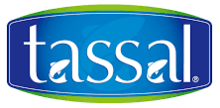Tassal
 | |
| Public company | |
| Traded as | ASX: TGR |
| Industry | Seafood processing |
| Founded | 1986 |
| Headquarters | Hobart, Tasmania, Australia |
Area served | Australia, New Zealand, Asia |
| Products | Processed and canned fish products |
| Revenue |
|
|
| |
|
| |
| Website | http://www.tassal.com.au/ |
Tassal is an Australian salmon farming company founded in 1986 and based in Tasmania. The company listed on the Australian Securities Exchange in 2003.
Tassal‘s Head office is in Hobart, with offices across Tasmania including the Huonville and Margate regions. The Sales and Marketing office is located in Melbourne.
Tassal's main competitors in Tasmania are Huon Aquaculture and Petuna Seafoods. It also competes with wild Atlantic salmon from countries such as Denmark and Norway.
Environmental, sustainability and health concerns
The investigative television program Four Corners aired an episode in October 2016 which raised a number of environmental, health and sustainability concerns regarding the practices of the company.[2] The program revealed that Tassal farmed fish were being fed the chemical compound Astaxanthin to give them their pink flesh. Unlike wild salmon, farmed fish would otherwise by grey in colour. In some countries the use of Astaxanthin to colour fish is prohibited or highly regulated.[3]
During November 2016 the Environmental Protection Authority ordered Tassal to fully harvest its Macquarie Harbour lease by the end of February 2017 after 14 non-compliance issues were identified. However, Tassal failed to comply with the order until April. Dr Rosalie Woodruff, a state MP, stated that "The order followed evidence of severe damage to the World Heritage Area in Macquarie Harbour"...Tassal refused to meet the EPA’s first deadline of 28 February. The EPA caved to industry pressure and agreed not to enforce the order until 15 April, despite evidence of damage to the World Heritage Area, which breaches state, national and international law".[4][5]
In May 2017 the Aquaculture Stewardship Council found Tassal had failed to comply with 19 requirements for ASC Certification. The Environment Tasmania organisation stated that "Anyone buying Tassal salmon needs to know the product has come from a marine dead zone and has damaged the World Heritage Area". Environment Tasmania also reported that fish were being "kept in conditions where there isn't enough oxygen for the fish to breathe".[6]
Concerns have been raised over the use of antibiotics by the company. Despite promising to cease using antibiotics, Tassal increased its use by 75% in 2015–16 when compared with the previous 12 months. The Australian reported that Tassal also recorded a more than 50 per cent rise in grams of antibiotic per tonne of fish produced: from 6g a tonne to 9.83g. Tassal uses the drug oxytetracycline, whilst the World Health Organization has argued for increased use of alternatives to feeding farmed animals antibiotics.[7]
Operations
Tassal operates three main hatcheries that have the capacity to produce ten million smolt a year. These smolt come from broodstock from an industry selective breeding program; five million of these smolt are kept at the state-of-the-art Rookwood Road Hatchery, which is set to undergo an expansion due for completion in April 2016 where we will see the overall capacity of Rookwood one and two reach in upwards of 10-11 million smolt. After 8–12 months at Rookwood Road these smolt are transferred to sea.
Tassal has six marine regions, where the standard pen has a volume of 11,600 cubic meters and holds enough salmon to produce 120 tonnes once harvested. Salmon are kept in these large sea cages between 12–18 months and continue to grow until they are ready to be harvested at an average weight of 5.0 kg live weight.
Tassal has three processing sites including a smokehouse that produces an average of 15.4 kg finished product per minute or 3,048 tonnes every year.
Brands
Tassal owns several brands, including:
- Tassal
- Superior Gold
- Tasmanian Smokehouse
- De Costi Seafoods
References
- ↑ "Tassal Annual Results (2017)" (PDF).
- ↑ "Big Fish - Four Corners". abc.net.au. Retrieved 2017-07-15.
- ↑ "www.choice.com.au/food-and-drink/meat-fish-and-eggs/fish/articles/astaxanthin-in-salmon-021116". choice.com.au. Retrieved 2017-07-15.
- ↑ "No Cookies | The Mercury". themercury.com.au. Retrieved 2017-07-15.
- ↑ "Tassal salmon farming lease under destocking order to escape standards probe - ABC News (Australian Broadcasting Corporation)". abc.net.au. Retrieved 2017-07-15.
- ↑ "Tassal given three months to clean up Macquarie Harbour salmon-farming leases - ABC News (Australian Broadcasting Corporation)". abc.net.au. Retrieved 2017-07-15.
- ↑ "Nocookies | The Australian". theaustralian.com.au. Retrieved 2017-07-15.